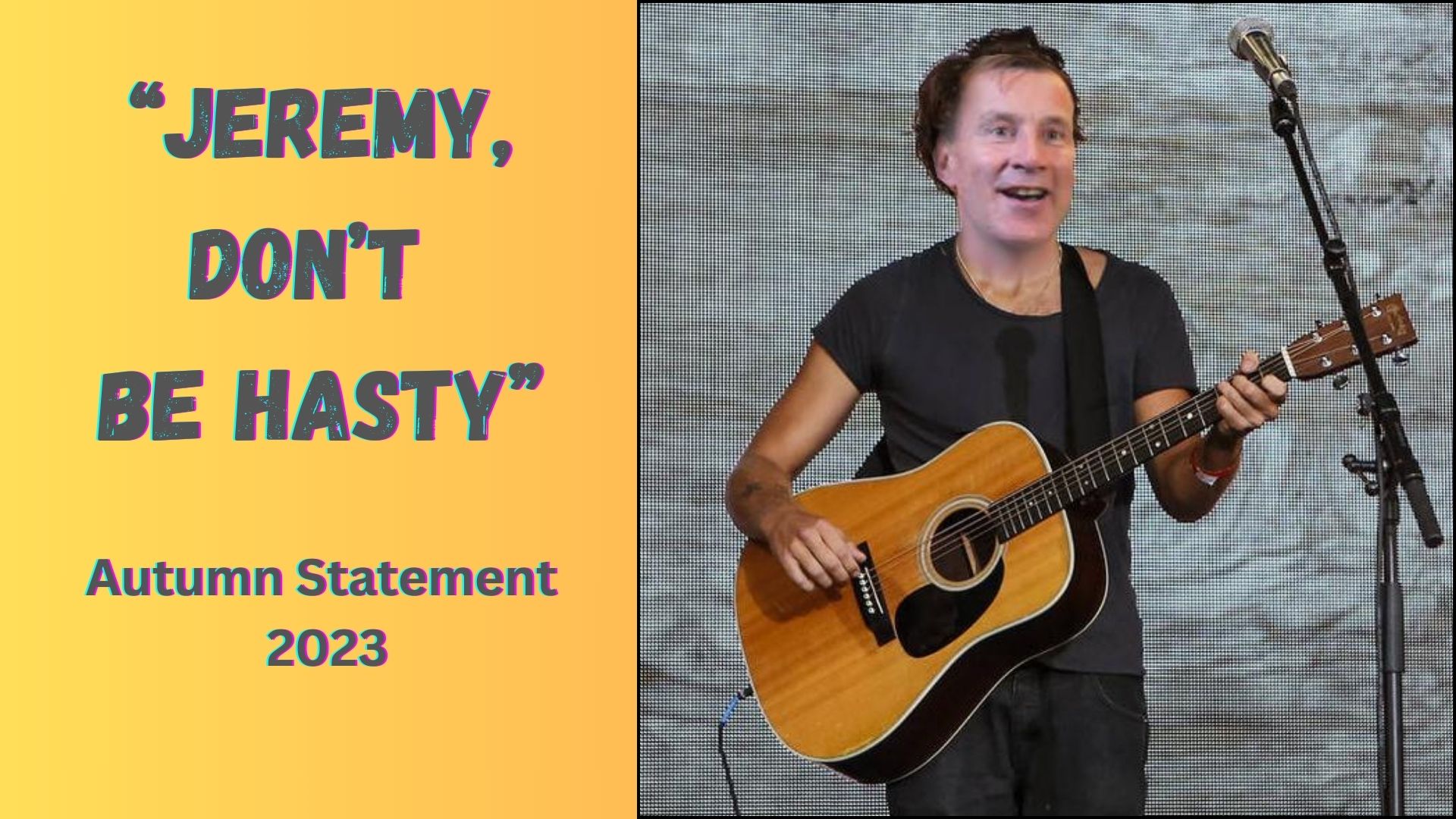
Autumn Statement 2023 & Jeremy’s Pencil Full of Lead
So, it’s that time of year again.
Later this week, the Chancellor, Jeremy Hunt, will be very much on the main stage delivering his Autumn Statement.
So what might be on the agenda?
What is going to get Hunt sharpening his Pencil Full of Lead?
Well, if reports are to be believed, it seems like there might be Candy in an election year. There is a strongly mooted reduction, or even abolition, of IHT.
It is easy to see why this might go down well in Conservative-shire.
But, I have one thing to say.
‘Jeremy, don’t be hasty’.
“You said you’d marry me, if only to save IHT”
Back in March 2018, the stage lights were turned off for good on comedy legend, Ken Dodd.
Of course, Dodd was not a total stranger to the tax authorities having been tried, and cleared, of tax fraud some three decades earlier.
However, it soon emerged that, in one last nose thumb to the tax man, the veteran entertainer had tied the knot with his partner of forty years just two days before he passed away. The result being a substantial IHT saving.
But steps like this might not be necessary if, as mooted, IHT is reduced or abolished.
Such a move is despite the fact that we are told that less than 5% of estates pay IHT. However, we are told that it is the most unpopular tax in the UK.
This is surprising because taxes that are paid only by other people are usually quite popular. (see my article – Is IHT the JarJar Binks of UK tax?)
But would this be a sensible move?
If this is framed as a statement that we are now focusing on economic growth, it seems difficult to come up with a more badly targeted tax cut.
It is hard to believe that death taxes saved on investments – including family homes etc – will be released into the wider economy and are, perhaps, more likely to strengthen the balance sheet of the Bank of Mum and Dad.
Further, under the current system, due to the availability of BPR, one might consider that:
- family business owners might be more inclined to leave value in their businesses as it is protected from IHT; and
- Granny Goggins might perhaps use her surplus cash to purchase interests in portfolios designed to qualify for BPR and shelter from IHT (an oddity I have commented on for several years now)
Is there a danger that this now goes into investment assets (including cash) that have little benefit to the economy?
Instead, is it better off to either reduce the rates of income tax and / or increase the personal allowance / tax thresholds in line with inflation? This will certainly feed money back into the economy as most people spend the additional cash.
However, income tax and NICs are the real heavy lifters – and these changes are likely to be much more expensive than an IHT cut (pretty much the only thing going for it).
Or, a business focused measure that reduces the rate of corporation tax – a rate that, for most companies, was increased by 30% from 19% to 25%? More money in the coffers of corporate accounts means more investment in their businesses (particularly with full expensing etc – which should be extended). This is perhaps more realistic.
My conclusion is that the IHT proposals are simply Candy in an election year.
They also probably represent a politic booby trap for Labour. What if the rate is dropped from April 2024? With a roadmap set out for abolishing it over several years. A key theme of the Conservatives strategy might be to corner Labour into confirming they would reverse the plan.
Hmmm.
“Oh, Jeremy don’t be hasty
No, don’t tax me cos’ of ma baby”
The flippant introduction above perhaps does not do justice to the foulness of the High-Income Child Benefit Charge (HICBC). A tax provision that was born flawed, has had a mean and cruel life, and should be put out of its misery… or we should be put out of the misery it has created.
As you probably know, HICBC is a punitive tax levied on households where the highest-earning member’s income exceeds £50,000. It has been a source of controversy since its foul conception in 2013.
The charge, designed to claw back child benefit payments from higher-income families.
It’s fundamental flaw lies in its reliance on an individual’s income rather than the household’s total income. This approach creates a glaring inequity, as a single earner with an adjusted net income of £60,000 faces the full HICBC, while a couple with each partner earning £50,000 is exempt. This disparity disregards the shared financial obligations within a household and unfairly penalises those with a single income source.
Further, its implementation has been fraught with practical challenges, causing confusion and administrative burdens for both taxpayers and HMRC.
The HICBC’s threshold, frozen at £50,000 since its introduction, has failed to keep pace with inflation, dragging more and more middle-income households into its scope. A common theme in the UK tax system.
Finally, it appears that its effectiveness in generating revenue is questionable. In 2019-20, it raised just £1 billion, a paltry sum compared to the proposed tax cuts we are told are being considered by the government.
Dig t’ole and bury it.
In addition, a review of all of the ludicrous cliff-edges that have worked their way into the system over the years should be conducted. They are symptomatic of an overly complex system that it tasked with achieving too much.
“Let me tax you where you’ll let me
Because you leaving just upsets me”
The area of residence and domicile will always be contentious.
As we have seen with the attention given to the status of Mrs Sunak, domicile is particularly incendiary.
I’d be surprised if Mr Hunt spoke at all about these areas this week.
It is understood that the domicile regime is something that will be looked at by any potential Labour government. However, I understand that this is more likely to be tweaked to provide a much shorter window where a non-dom can obtain tax benefits.
Whoever is in power, there is a balancing act to be struck. International wealth seems pretty transient at the moment and other regimes are welcoming wealthy and productive individuals and businesses with open arms.
However, we have seen evidence that HMRC might up its activity when it comes to patrolling the UK’s fiscal borders. Ensuring that people do not leave the UK’s tax net.
Indeed, we have seen evidence that HMRC has launched a One to Many, or nudge letter, campaign in this area. (see my article – Last of the International Playboys and / or Playgirls)
So, whilst the Conservatives might be participating in formation ‘stop the boats’ chanting in one respect.
HMRC might have a slightly different take on the same phrase.
“And I’ll be around again to see these middle men
That should be more adequate in the tax department”
Looking at HMRC’s figures, it seems virtually all perceived tax avoidance is in the umbrella and contractor market.
It is clear that HMRC and the Government are both aware that compliance needs to be ratcheted up… and their most recent consultation / call to evidence closed at the end of August.
Where one is tasked with the responsibility of operating PAYE, one is effectively given the responsibility of deducting taxes and paying them over on behalf of HMRC / Treasury.
This is a serious responsibility.
My view is that for firms that are doing this on a commercial basis – in other words, not simply operating their own firms – there should be greater checks and balances.
In my article back in September (Any Umbrellas to Fix Today?), I suggested a solution which could be borrowed from the sleepy world of pension administration (where a similar delegated responsibility can be seen) and polished up by HMRC for umbrella companies.
It stops short of regulation – but puts the keys to the PAYE kingdom firmly in HMRC’s hands. In other words, if you aren’t fit and proper, we won’t be sending you a PAYE reference.
I would be amazed if there were no announcements in this area.
So, what would you like to see in the Autumn Statement?
What are your… ahem… Last Requests?
If you have any queries about the Autumn Statement 2023, or tax matters in general, then please get in touch.
